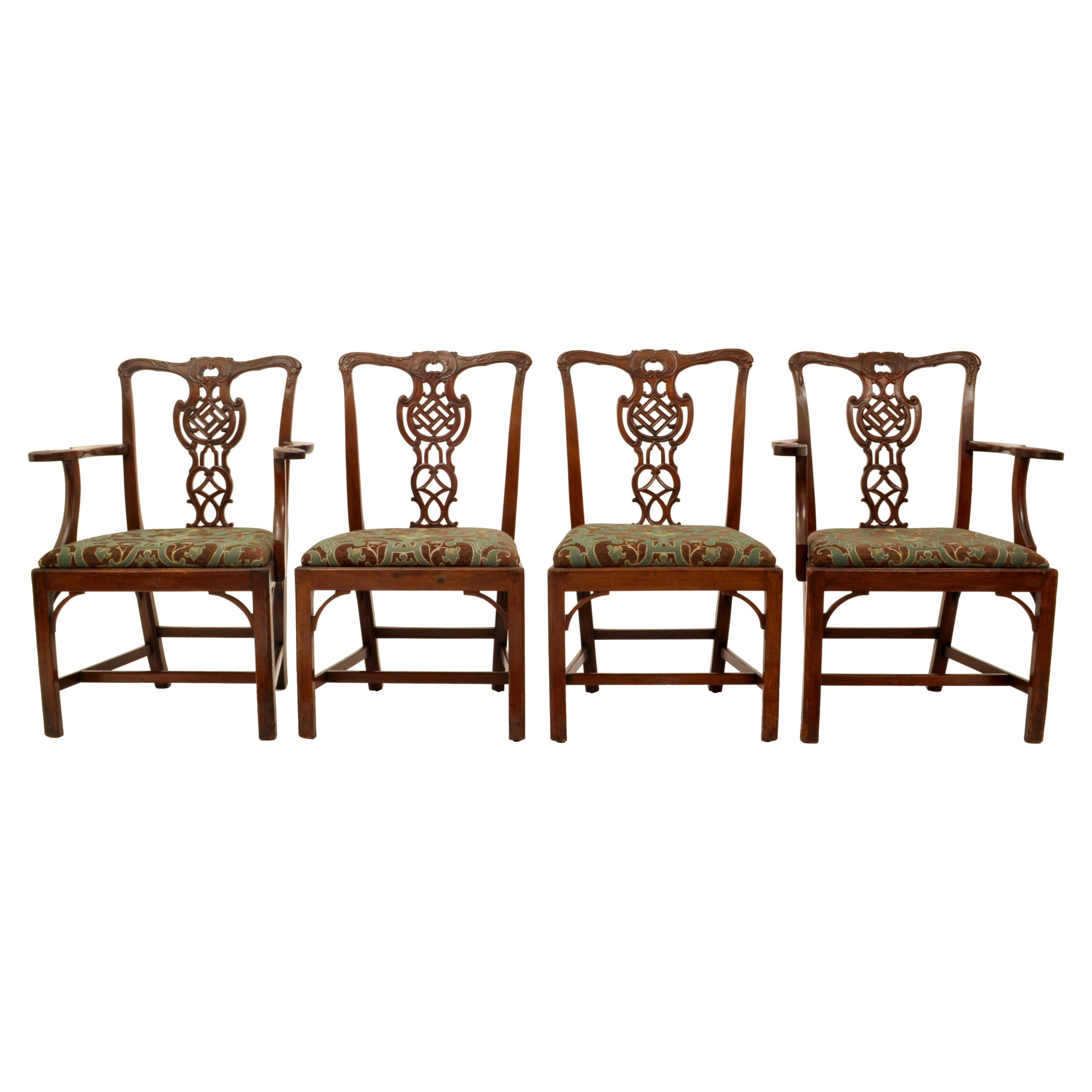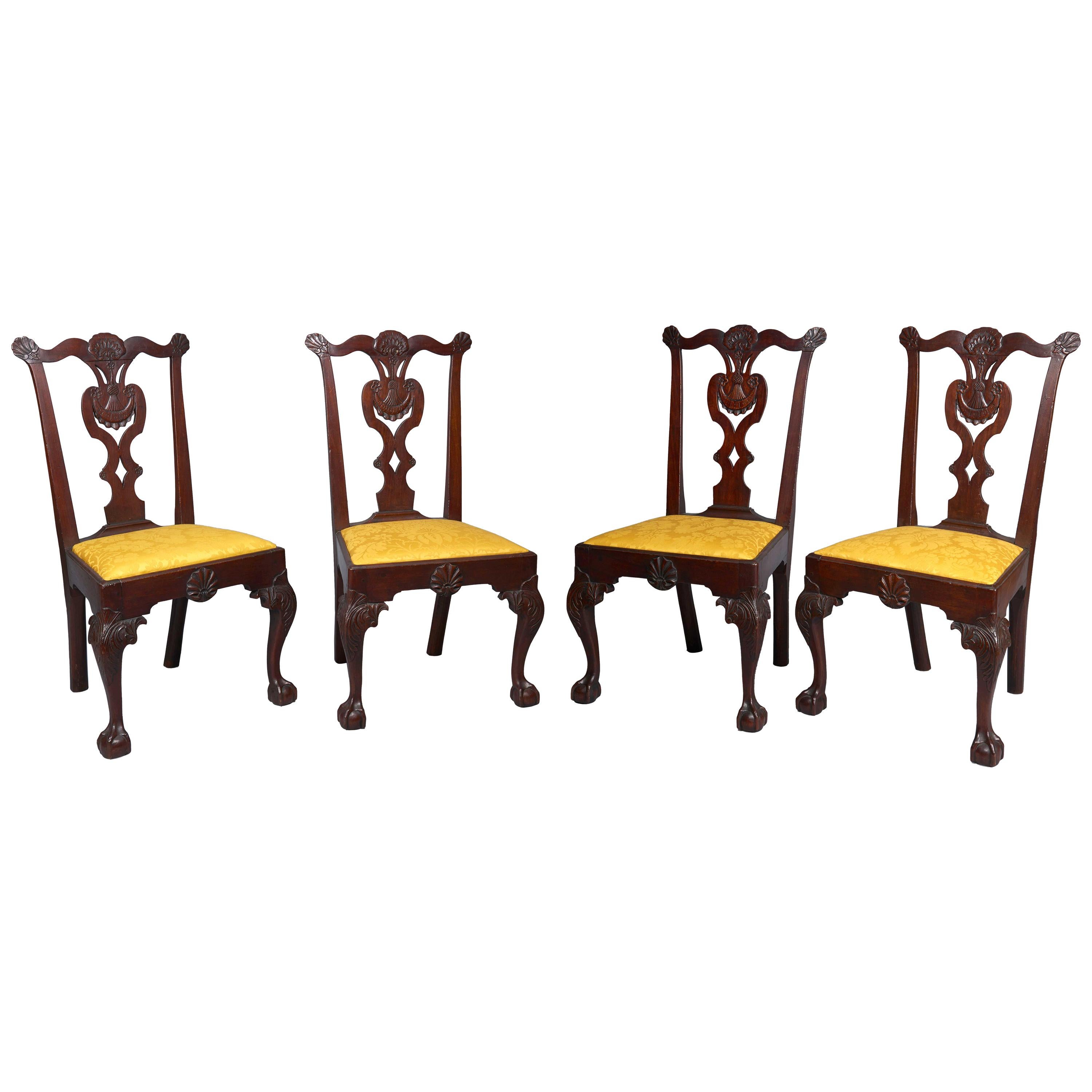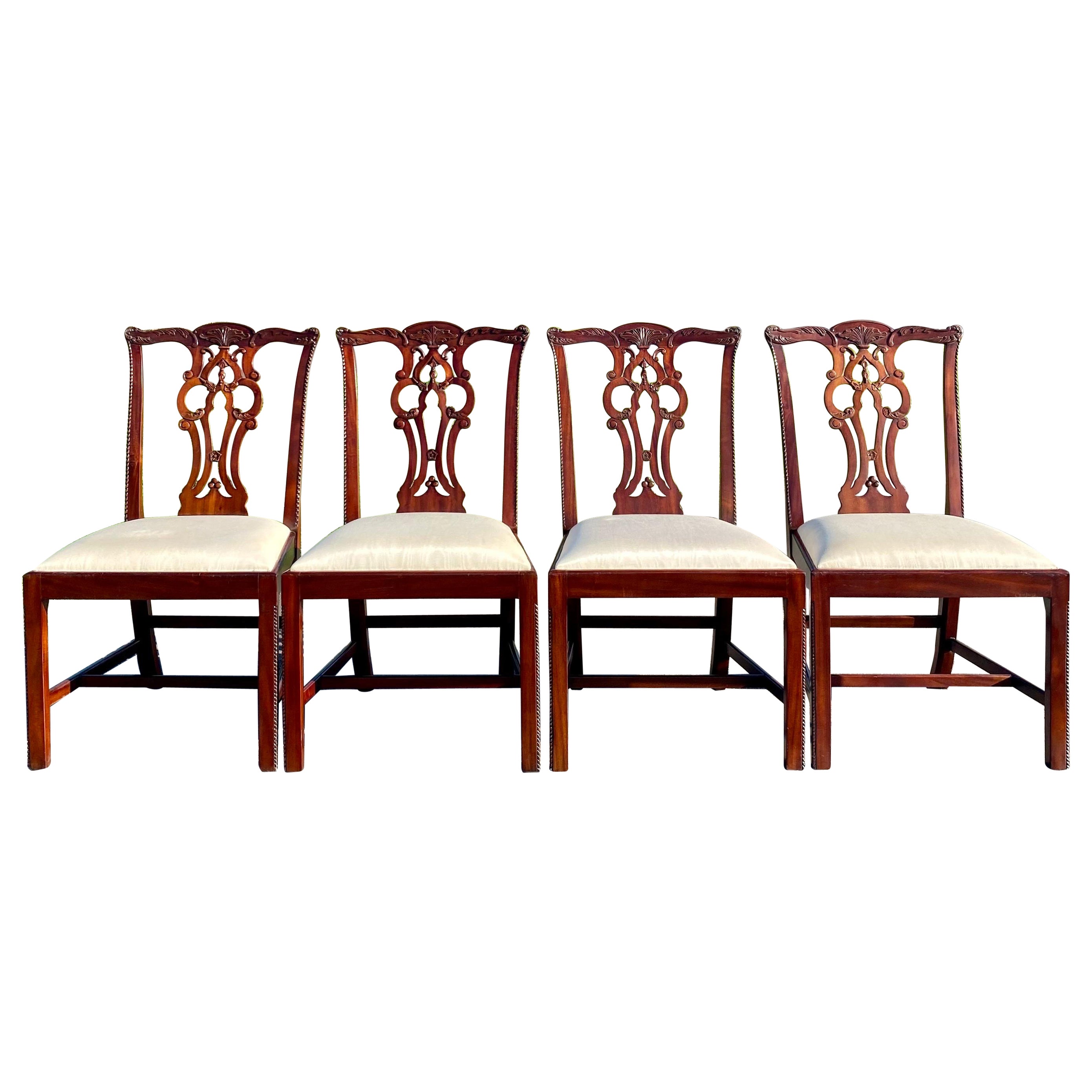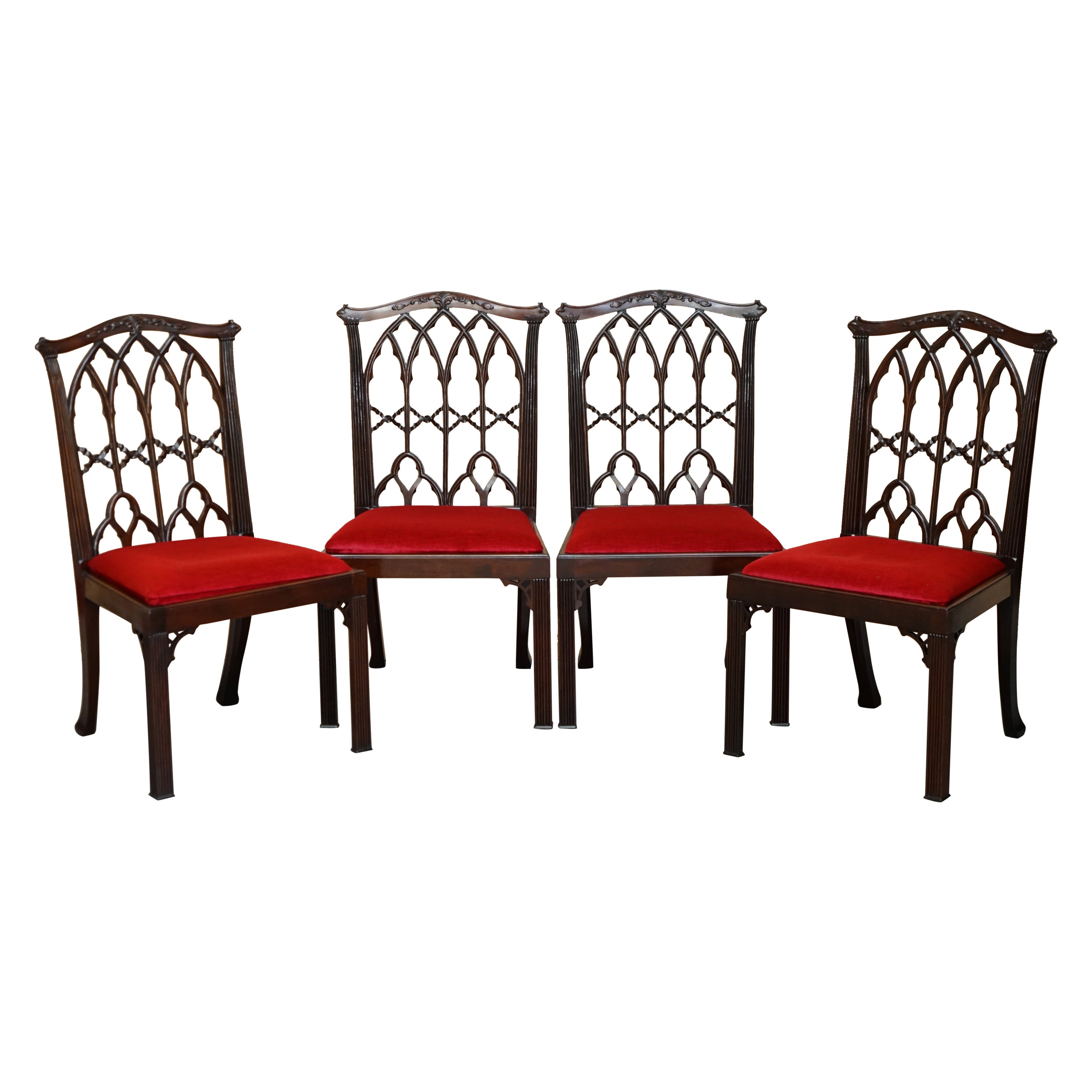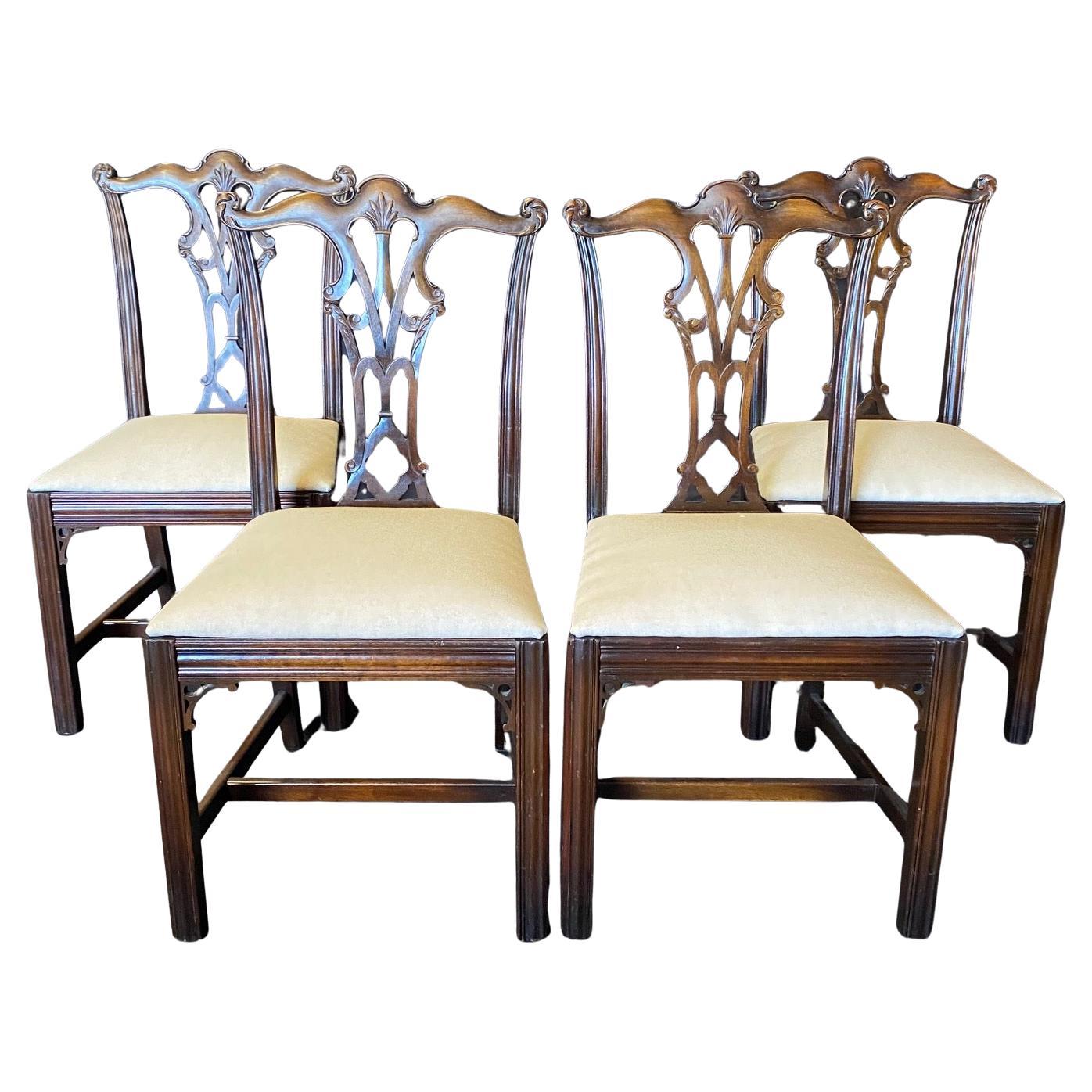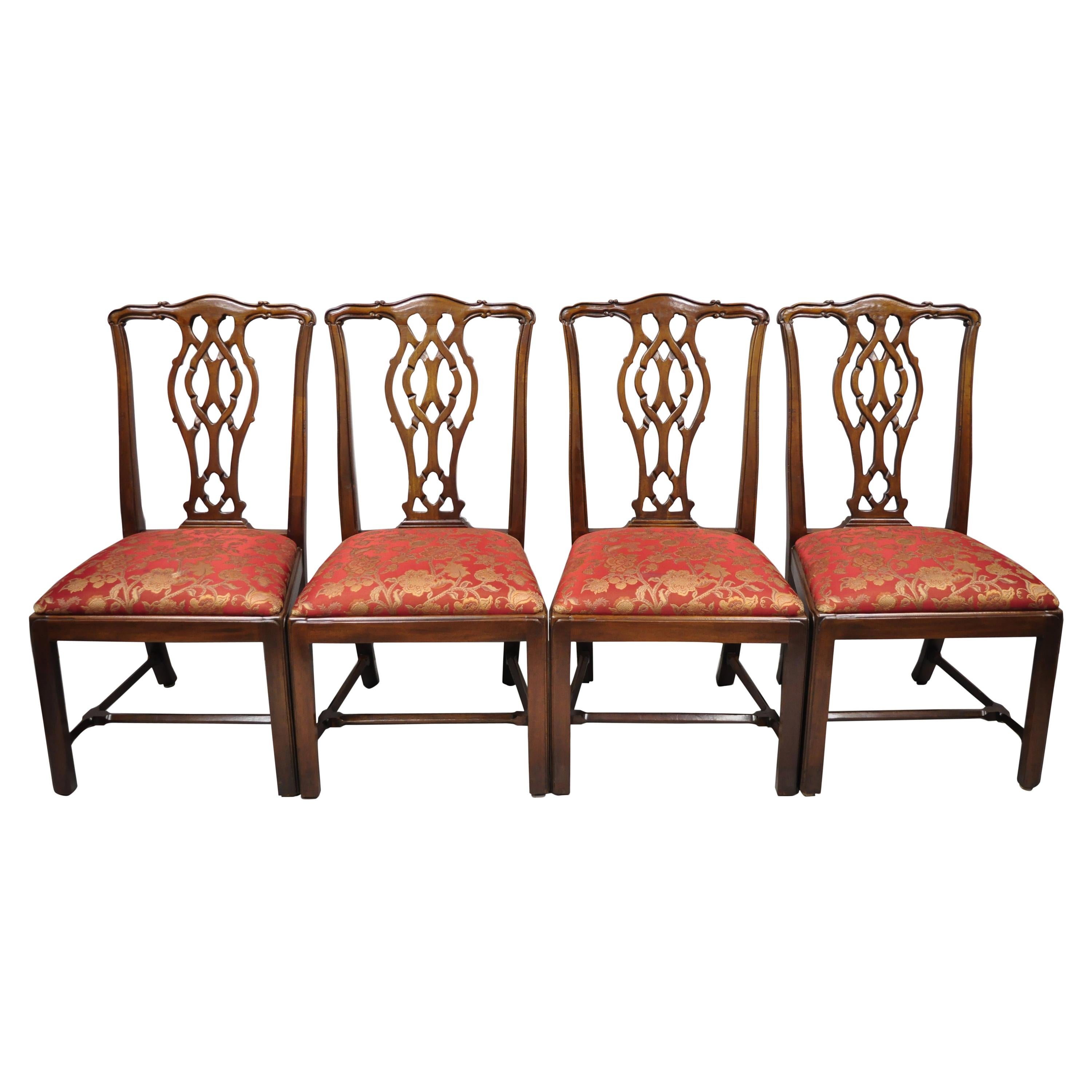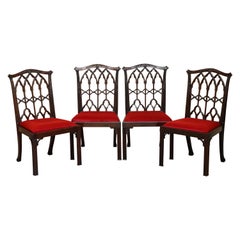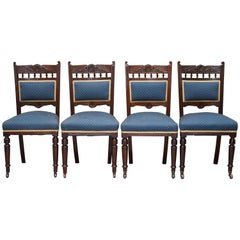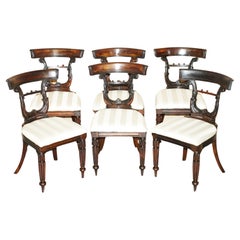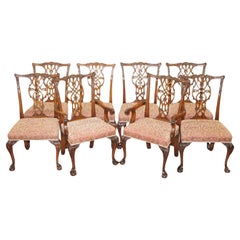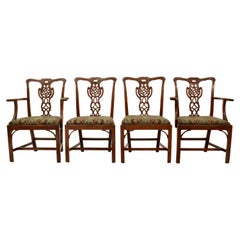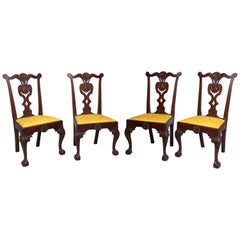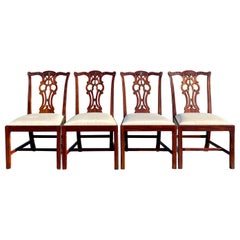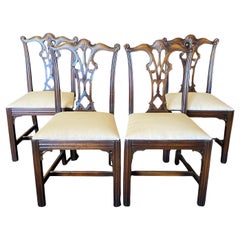Items Similar to FOUR ANTIQUE COLONIAL THOMAS CHIPPENDALE HARDWOOD FRET WORK CARVED DiNING CHAIRS
Want more images or videos?
Request additional images or videos from the seller
1 of 21
FOUR ANTIQUE COLONIAL THOMAS CHIPPENDALE HARDWOOD FRET WORK CARVED DiNING CHAIRS
$16,825per set
$21,031.25per set20% Off
£12,000per set
£15,000per set20% Off
€14,257.92per set
€17,822.40per set20% Off
CA$22,961.29per set
CA$28,701.61per set20% Off
A$25,569.47per set
A$31,961.84per set20% Off
CHF 13,307.50per set
CHF 16,634.37per set20% Off
MX$315,268.47per set
MX$394,085.59per set20% Off
NOK 169,481.14per set
NOK 211,851.42per set20% Off
SEK 159,295.84per set
SEK 199,119.80per set20% Off
DKK 106,381.80per set
DKK 132,977.24per set20% Off
Shipping
Retrieving quote...The 1stDibs Promise:
Authenticity Guarantee,
Money-Back Guarantee,
24-Hour Cancellation
About the Item
Royal House Antiques
We are delighted to offer this important suite of museum quality, antique Colonial Rosewood Thomas Chippendale, fret work carved dining chairs
Please note the delivery fee listed is just a guide and covers London only for the UK and local Europe for the rest of the world, if you are outside of this area please send me your address and I will provide you with an accurate quote
Where to begin, if you’re looking at this listing then the chances are you know exactly how significant this suite is, Thomas Chippendale was simply put, the most important furniture designer in history, these chairs are the only Colonial examples I have ever seen and in Rosewood no less, they weigh roughly three times more than a standard dining chair of the same style and size, they are very substantial
The chairs are late 19th century circa 1880-1900, they are of course based on the original 18th century examples, the carving is exquisitely executed and the chairs look sophisticated and elegant from all angles
The suite has been sympathetically restored to include a deep clean, hand condition wax and hand polish, the seat covers have been left as they are, they are ok, I can have them reupholstered for the cost price to anything the new owners wish
Literature
Two chairs illustrated in Tabellenbuch Holztechnik, Hamburg, 2013, p. 271.
Exhibited
Ten chairs on loan to Birmingham Museums circa 1985-2010 and exhibited at Aston Hall, Birmingham, where photographed in situ..
Dimensions
Height:- 93cm
Width:- 56cm
Depth:- 53cm
Seat height:- 47cm
Please note all measurements are taken at the widest point.
Lot Essay
These chairs are closely related to those in two recognised Chippendale commissions: Sir Gilbert Heathcote (d. 1785), 3rd Baronet for Normanton Hall, Rutland and William Crichton-Dalrymple, 5th Earl of Dumfries (4th Earl of Stair, 1699-1768) for Dumfries House, Ayrshire.
THE RELATED CHAIRS
The chairs are of identical decoration to the set of two armchairs and ten single chairs, circa 1765, formerly at Normanton Hall (1). In 1759, Sir Gilbert Heathcote (d. 1785), 3rd Baronet, succeeded to the vast inheritance established by his grandfather, also Gilbert, 1st Baronet (1652-1733), who was reputed to be ‘the richest commoner in England’ (2). The 3rd Baronet employed both Chippendale Senior and his son, Chippendale Junior, in the furnishing of his Palladian mansion, Normanton Hall in Rutland, and his London houses, 29 Grosvenor Square, London and Browne's House at North End, Fulham. Surviving Chippendale accounts, although incomplete, show that the firm was working periodically for members of the Heathcote family from 1768 to 1821. Most of the furniture listed in these accounts was intended for Browne’s House, although after 1798 when the family relinquished this residence some of the furniture was moved to Normanton Hall. The latter was sold in 1924, and any furniture not included in the Normanton Hall sale was taken to the Earl of Ancaster’s seat at Grimsthorpe Castle, Lincolnshire. Chippendale’s earliest invoice for Sir Gilbert Heathcote records the acquisition in 1768 of ‘6 India Back and arm chairs Japand to imitate the Bamboe’, signifying how the family embraced the highly fashionable chinoiserie taste. Although the Normanton chairs cannot be conclusively identified in the extant Chippendale accounts, their form and ornamentation led Christopher Gilbert to suggest that they were possibly by Chippendale (3).
The set of four mahogany chairs at Dumfries House have nearly-identical pagoda-form cresting rails and identical terminals but differ in the arrangement of the 'Chinese' paling in the backs and side panels. Although no documentary evidence for the Dumfries chairs survives, in their execution and sophisticated carving of the toprails, they are extremely close to Chippendale’s hand.
Another near-set of closely related chairs is at Saltram House, Devon, where Chippendale worked between 1771-2; these dates are based on payments in John Parker's cash account book, and probably do not reflect a true picture of the entire commission as Parker often paid tradesmen by banker's draft (4). Comprising two armchairs and seven single chairs, this set, circa 1765, is made of padouk, and has been described by the National Trust as ‘Chinese Export’ (5). The set was returned to Saltram in 1951 having been accepted by H.M. Treasury in lieu of full payment of Death Duty from the Executors of Edmund Robert Parker, 4th Earl of Morley (1877-1951). Some of the chairs are currently on display in ‘The Chinese Chippendale Bedroom’.
A further set of four padouk chairs of the Saltram pattern was almost certainly at Kenwood House, London; some of these are recorded in 18th century inventories drawn up by Lord Mansfield. This set was removed to Scone Palace, Perth, prior to the auction at Kenwood in 1922, and subsequently sold from ‘Scone Palace and Blairquhan: The Selected Contents of Two Great Scottish Houses’, Christie’s, London, 24 May 2007, lot 298.
Another pair of padouk chairs of this model sold ‘The Collection of Peggy and David Rockefeller’, Christie’s, New York, 10 May 2018, lot 647 ($193,750 inc. premium).
THE DESIGN
Conceived in the Chinese manner expounded by William and John Halfpenny in Rural Architecture in the Chinese Taste (1752), and Sir William Chambers in his Designs of Chinese Buildings, Furniture, Dresses, Machines and Utensils (1757), the pattern for this set of ‘Pagoda’ chairs relates to nine designs for ‘Chinese Chairs’ in the 1st edition of Chippendale’s Director (1754); the cabinet-maker describes these designs thus:
Plates XXIII, XXIV and XXV are nine Chairs in the present Chinese manner, which I hope will improve that taste, or manner of work; it having yet never arrived to any perfection; doubtless it might be lost without feeling its beauty: as it admits of the greatest variety, I think it the most useful of any other. The sizes are all specified on the designs. The three last (No. XXV.) I hope will be well received, as there has been none like them yet made.
The Georgian period witnessed the proliferation of such railed and pagoda-crested chairs in both the ‘picturesque’ Chinese tea pavilions of landscaped parks as well as in fashionable apartments hung with ‘India’ paper. The geometric ‘Chinese’ feet of these chairs are also found on a set of pedestals, 1774, originally japanned green and gold, supplied to Harewood House, and also on a bureau dressing table from Paxton House, Berwickshire (6).
AYKLEY HEADS HOUSE, CO. DURHAM
The Dixon and Johnson families were united in 1749 by the marriage of Christopher Johnson (1718-87) and Tabitha Dixon, youngest daughter of George Dixon of Aykley Heads, and heiress to her brother John. Thus, the Aykley Heads estate passed through the female line to Tabitha’s son, Francis Johnson (1757-1851), and subsequently to his son, Francis Dixon Johnson (1803-1867); in 1929, the Dixon-Johnson family moved to Middle Ord, Northumberland. The descent of the family name has taken both forms, as Johnson and Dixon-Johnson, the latter being formally taken in the later nineteenth century (although still appearing in unhyphenated form). As well as the legal profession and land in Co. Durham, the family acquired coal-mining interests.
(1) C. Gilbert, The Life and Work of Thomas Chippendale, Leeds, 1978, vol. II, p. 101, fig. 167.
(2) Ibid., vol. I, p. 248.
(3) Ibid., p. 249.
(4) Ibid., p. 257.
(5) C. Johnson, Saltram: National Trust Guide Book, revised 2005, p. 28; NT 871346.1-5 (single chairs); NT 871346.6-7 (armchairs).
(6) Gilbert, op. cit., vol. II, p. 208, fig. 380; p. 228, fig. 415. The Paxton bureau dressing table sold, Christie’s, London, 14 May 2003, lot 140 (£77,675 inc. premium), and later, Sotheby’s, London, 10 November 2015, lot 123.
Condition
Please view the very detailed pictures as they form part of the description around condition
Please note vintage period and original items such as leather seating will always have natural patina in the form of cracking creasing and wear, we recommend regular waxing to ensure no moisture is lost, also hand dyed leather is not recommended to sit in direct sunlight for prolonged periods of time as it will dry out and fade.
- Creator:Thomas Chippendale (Maker)
- Dimensions:Height: 36.62 in (93 cm)Width: 22.05 in (56 cm)Depth: 20.87 in (53 cm)Seat Height: 18.51 in (47 cm)
- Sold As:Set of 2
- Style:Victorian (Of the Period)
- Materials and Techniques:
- Place of Origin:
- Period:
- Date of Manufacture:1880
- Condition:Wear consistent with age and use. Minor fading.
- Seller Location:West Sussex, GB
- Reference Number:1stDibs: LU2823339548992
About the Seller
4.7
Platinum Seller
Premium sellers with a 4.7+ rating and 24-hour response times
Established in 2012
1stDibs seller since 2017
1,984 sales on 1stDibs
Typical response time: 1 hour
- ShippingRetrieving quote...Shipping from: West Sussex, United Kingdom
- Return Policy
Authenticity Guarantee
In the unlikely event there’s an issue with an item’s authenticity, contact us within 1 year for a full refund. DetailsMoney-Back Guarantee
If your item is not as described, is damaged in transit, or does not arrive, contact us within 7 days for a full refund. Details24-Hour Cancellation
You have a 24-hour grace period in which to reconsider your purchase, with no questions asked.Vetted Professional Sellers
Our world-class sellers must adhere to strict standards for service and quality, maintaining the integrity of our listings.Price-Match Guarantee
If you find that a seller listed the same item for a lower price elsewhere, we’ll match it.Trusted Global Delivery
Our best-in-class carrier network provides specialized shipping options worldwide, including custom delivery.More From This Seller
View AllFOUR ANTIQUE CIRCA 1900 ENGLISH THOMAS CHIPPENDALE GOTHIC REVIVAL DINING CHAIRs
By Thomas Chippendale
Located in West Sussex, Pulborough
Royal House Antiques
Royal House Antiques is delighted to offer for sale this exquisite, highly collectable suite of circa 1900-1920 English Mahogany Thomas Chippendale style Gothic...
Category
Antique Early 1900s English Gothic Revival Dining Room Chairs
Materials
Hardwood
$3,308 Sale Price / set
20% Off
Stunning Suite of Original Solid Hardwood Victorian Maple & Co. Dining Chairs
By Maple & Co.
Located in West Sussex, Pulborough
We are delighted to offer for sale this lovely suite of four original Maple & Co. solid mahogany dining chairs
These chairs are part of a suite
These are a very well made set, ...
Category
Antique 19th Century English Victorian Dining Room Chairs
Materials
Upholstery, Hardwood
$1,682 Sale Price / set
20% Off
SIX GILLOWS OF LANCASTER ATTRIBUTED ANTIQUE HARDWOOD REGENCY 1810 DINING CHAIRs
By Gillows of Lancaster & London
Located in West Sussex, Pulborough
Royal House Antiques
We are delighted to offer this important suite of museum quality, antique Colonial Gillows of Lancaster Attributed solid Rosewood dining chairs with ornately carved back splats
Please note the delivery fee listed is just a guide and covers London only for the UK and local Europe for the rest of the world, if you are outside of this area please send me your address and I will provide you with an accurate quote
Where to begin, if you’re looking at this listing then the chances are you know exactly how significant this suite is, Gillows of Lancaster & London was simply put, one of the most important furniture designers in the history of England, these chairs are the only Colonial examples I have ever seen and in Rosewood no less, they weigh roughly three times more than a standard dining chair of the same style and size, they are very substantial
The chairs early 19th century circa 1810-1820, the carving is exquisitely executed and the chairs look sophisticated and elegant from all angles
The suite has been sympathetically restored to include a deep clean, hand condition wax and hand polish, the seat covers have been left as they are, they are fine, the timber has a wonderfully aged patina that is honestly sublime
Dimensions
Height:- 81cm
Width:- 45cm
Depth:- 50cm
Seat height:- 44cm
Please note all measurements are taken at the widest point.
Lot Essay
These chairs are closely related to those in two recognised Chippendale commissions: Sir Gilbert Heathcote (d. 1785), 3rd Baronet for Normanton Hall, Rutland and William Crichton-Dalrymple, 5th Earl of Dumfries (4th Earl of Stair, 1699-1768) for Dumfries House, Ayrshire.
THE RELATED CHAIRS
The chairs are of identical decoration to the set of two armchairs and ten single chairs, circa 1765, formerly at Normanton Hall (1). In 1759, Sir Gilbert Heathcote (d. 1785), 3rd Baronet, succeeded to the vast inheritance established by his grandfather, also Gilbert, 1st Baronet (1652-1733), who was reputed to be ‘the richest commoner in England’ (2). The 3rd Baronet employed both Chippendale Senior and his son, Chippendale Junior, in the furnishing of his Palladian mansion, Normanton Hall in Rutland, and his London houses, 29 Grosvenor Square, London and Browne's House at North End, Fulham. Surviving Chippendale accounts, although incomplete, show that the firm was working periodically for members of the Heathcote family from 1768 to 1821. Most of the furniture listed in these accounts was intended for Browne’s House, although after 1798 when the family relinquished this residence some of the furniture was moved to Normanton Hall. The latter was sold in 1924, and any furniture not included in the Normanton Hall sale was taken to the Earl of Ancaster’s seat at Grimsthorpe Castle, Lincolnshire. Chippendale’s earliest invoice for Sir Gilbert Heathcote records the acquisition in 1768 of ‘6 India Back and arm chairs Japand to imitate the Bamboe’, signifying how the family embraced the highly fashionable chinoiserie taste. Although the Normanton chairs cannot be conclusively identified in the extant Chippendale accounts, their form and ornamentation led Christopher Gilbert to suggest that they were possibly by Chippendale (3).
The set of four mahogany chairs at Dumfries House have nearly-identical pagoda-form cresting rails and identical terminals but differ in the arrangement of the 'Chinese' paling in the backs and side panels. Although no documentary evidence for the Dumfries chairs survives, in their execution and sophisticated carving of the toprails, they are extremely close to Chippendale’s hand.
Another near-set of closely related chairs is at Saltram House, Devon, where Chippendale worked between 1771-2; these dates are based on payments in John Parker's cash account book, and probably do not reflect a true picture of the entire commission as Parker often paid tradesmen by banker's draft (4). Comprising two armchairs and seven single chairs, this set, circa 1765, is made of padouk, and has been described by the National Trust as ‘Chinese Export’ (5). The set was returned to Saltram in 1951 having been accepted by H.M. Treasury in lieu of full payment of Death Duty from the Executors of Edmund Robert Parker, 4th Earl of Morley (1877-1951). Some of the chairs are currently on display in ‘The Chinese Chippendale Bedroom’.
A further set of four padouk chairs of the Saltram pattern was almost certainly at Kenwood House, London; some of these are recorded in 18th century inventories drawn up by Lord Mansfield. This set was removed to Scone Palace, Perth, prior to the auction at Kenwood in 1922, and subsequently sold from ‘Scone Palace and Blairquhan: The Selected Contents of Two Great Scottish Houses’, Christie’s, London, 24 May 2007, lot 298.
Another pair of padouk chairs of this model sold ‘The Collection of Peggy and David Rockefeller’, Christie’s, New York, 10 May 2018, lot 647 ($193,750 inc. premium).
THE DESIGN
Conceived in the Chinese manner expounded by William and John Halfpenny in Rural Architecture in the Chinese Taste (1752), and Sir William Chambers in his Designs of Chinese Buildings, Furniture, Dresses, Machines and Utensils (1757), the pattern for this set of ‘Pagoda’ chairs relates to nine designs for ‘Chinese Chairs’ in the 1st edition of Chippendale’s Director (1754); the cabinet-maker describes these designs thus:
Plates XXIII, XXIV and XXV are nine Chairs in the present Chinese manner, which I hope will improve that taste, or manner of work; it having yet never arrived to any perfection; doubtless it might be lost without feeling its beauty: as it admits of the greatest variety, I think it the most useful of any other. The sizes are all specified on the designs. The three last (No. XXV.) I hope will be well received, as there has been none like them yet made.
The Georgian period witnessed the proliferation of such railed and pagoda-crested chairs in both the ‘picturesque’ Chinese tea pavilions of landscaped parks as well as in fashionable apartments hung with ‘India’ paper. The geometric ‘Chinese’ feet of these chairs are also found on a set of pedestals...
Category
Antique 1810s English George III Dining Room Chairs
Materials
Hardwood
$7,795 Sale Price / set
20% Off
Set of Eight Solid Hardwood Claw & Ball Feet Thomas Chippendale Dining Chairs 8
By Thomas Chippendale
Located in West Sussex, Pulborough
We are delighted to offer for sale this sublime suite of eight vintage ornately hand carved Mahogany dining chairs after the original by Thomas Chippendale
These chairs are amazing,...
Category
20th Century English Chippendale Dining Room Chairs
Materials
Upholstery, Hardwood
$6,730 Sale Price / set
20% Off
Rare Set of Six 18th Century circa 1760 Dutch Elm Marquetry Inlaid Dining Chairs
Located in West Sussex, Pulborough
We are delighted to offer for sale this stunning and exceptionally rare set of six totally original 18th century circa 1760 hand carved Dutch Elm Marquetry i...
Category
Antique 1760s English George III Dining Room Chairs
Materials
Elm, Walnut
$10,655 Sale Price / set
20% Off
SIX EXQUISITE ViNTAGE THOMAS CHIPPENDALE CHINESE PAGODA TOP DINING CHAIRS
By Thomas Chippendale
Located in West Sussex, Pulborough
Royal House Antiques
We are delighted to offer this stunning suite of museum quality, George III style Thomas Chippendale Chinese Pagoda to...
Category
Vintage 1940s English George III Dining Room Chairs
Materials
Upholstery, Hardwood
$20,750 Sale Price / set
20% Off
You May Also Like
Antique 19th Century Set of Four Carved Mahogany Chippendale Dining Chairs 1890
Located in Portland, OR
A good set of four antique Chippendale Revival carved mahogany chairs, circa 1890.
The chairs are finely carved from high quality solid mahogany, each chair having back rails & arms ...
Category
Antique Late 19th Century English Chippendale Dining Room Chairs
Materials
Mahogany
$1,925 Sale Price / set
30% Off
Chippendale Very Rare Set of Four Highly Carved Mahogany Side Chairs
Located in West Chester, PA
Carved shell ears with highly carved splat. Shell on center rail with carved knee returns and acanthus carved legs with ball and claw feet. Descended in the James Henderson family of New York and the James Monroe...
Category
Antique 18th Century American Chippendale Side Chairs
Materials
Mahogany
Maitland Smith Chippendale Regency Carved Mahogany Dining Side Chairs
By Maitland Smith
Located in Lambertville, NJ
Beautiful set of four Maitland Smith Massachusetts Regency Mahogany side chairs. Features hand carved solid Mahogany Chippendale styling with handsome straight legs. Dark mahogany wood frame with original neutral cream/ beige faux bois pattern fabric seats. Very comfortable back support and wide seating provides plenty of bottom support.
You will love the intricate and sculptural hand carved detailing on crest rail, back splat and the beading on straight legs and stretchers. This is a perfect set of four side chairs for the dining room, living room, or game table, bedroom, desk or office, and of course extra seating for Thanksgiving and your holiday dinners...
Category
2010s Hollywood Regency Dining Room Chairs
Materials
Upholstery, Wood
Set of 4 Mahogany Chippendale Dining Chairs with New Upholstery
By Grand Rapids Furniture Co.
Located in Hopewell, NJ
A gorgeous set of four Chippendale style dining chairs midcentury solid mahogany frames, with new neutral high end fabric upholstered seats. Claremont from Grand Rapids Chair company...
Category
Vintage 1960s American Chippendale Dining Room Chairs
Materials
Upholstery, Mahogany
Set of 4 Mahogany Chippendale Style Dining Side Chairs Attributed to Bernhardt
By Bernhardt
Located in Philadelphia, PA
Set of 4 mahogany Chippendale style dining side chairs attributed to Bernhardt. Listing includes (4) side chairs, solid wood frame, nicely carved details, very nice vintage item, gre...
Category
Late 20th Century North American Chinese Chippendale Dining Room Chairs
Materials
Mahogany
Classic Set of Four Early 19th Century Carved Oak British Dining Side Chairs
Located in Hopewell, NJ
Really lovely set of four early 19th century carved oak British dining chairs with original patina and rush seats. #4178.
Category
Antique 1820s English Dining Room Chairs
Materials
Rush, Oak
